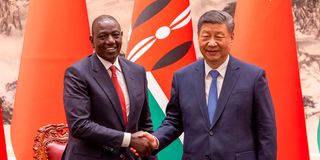Premium
Kenyan parliament rejects US Senate criticism on China ties

President William Ruto with his Chinese counterpart Xi Jinping at the Great Hall of the People in Beijing, China.
The Kenyan Parliament on Monday rejected the assertion by the US Senate that Nairobi was turning away from Washington for China’s goodies. Instead, a lawmaker representing a committee in charge of foreign relations said Kenya was free to expand partnerships while maintaining traditional alliances.
Last week, US Senator Jim Risch (R-Idaho), chairman of the Senate Foreign Relations Committee, told a hearing on ‘East Africa & The Horn: At A Turning Point or Breaking Point?’ that Kenya was inching closer to China, in spite of being traditionally a US ally.
“Just last month, President Ruto declared that Kenya, a major non-NATO ally, and China are ‘co-architects of a new world order’. That’s not just alignment to China; it’s allegiance,” he told the session on May 13.
“Relying on leaders who embrace Beijing so openly is an error. It’s time to reassess our relationship with Kenya and others who forge tight bonds with China.”
Nelson Koech, the Kenyan legislator for Belgut Constituency and chairperson of the Defence, Foreign Affairs and Intelligence Committee, said Kenya won’t be changing allegiance, but is pushing for new “conversations”.
“President Ruto’s reference to Kenya and China as ‘co-architects of a new world order’ must be viewed as an assertion of Africa’s right to shape its future, not as a pivot in allegiance,” Koech wrote in a letter to Risch on Monday.
“Kenya is calling for a more just global system — one where Africa contributes meaningfully to international governance and economic policy. This aspiration mirrors President Trump’s own push for reform within global institutions.”
The controversy had started last month when President William Ruto toured Beijing for a State visit, a first for an African leader this year. At a public lecture at Peking University, Ruto lampooned trade tariffs and wars and said there must be a new world order in which fairness is respected.
“Kenya and China are not merely trading partners. They are co-architects of a new world order, one that is fair, inclusive and sustainable,” he said on April 23.
“Let us measure our success, not in GDP growth or in trade volumes, but in how many lives we uplift and how much dignity we restore.”
The State visit came just a year after Ruto had made a similar trip to the US under Joe Biden, becoming the first African leader since John Kuffuor in 2008 to be hosted in a state visit in Washington.
Ruto did refer to that Washington, saying the state visit to Beijing mirrored his trip to the US. “Perhaps, symbolically, Kenya can serve as a bridge between east and west, north and south in an era of deepening geopolitical tensions.”
But as Kenya had become a major non-NATO ally after May last year, the US lawmakers viewed Ruto’s speech as an indication of breaking commitments. Being a major non-NATO ally means Kenya could profit from some of the US security support, even if it means they won’t come for free.
Koech said Ruto’s speech in Beijing was consistent with his arguments for reforms in global organisations.
“From the United Nations to the World Trade Organization, his administration consistently questioned outdated structures and demanded fairer terms for American interests.
“Kenya is asking for the same — not to dismantle multilateralism, but to rebuild it on principles of equity and shared responsibility.”
At the Senate session last week, however, US lawmakers were generally concerned of China’s rising influence on the continent, with US Senator Jeanne Shaheen, a ranking member of the Senate Foreign Relations Committee admitting “they are eating our lunch there”.
China has risen over the last 20 years to become the biggest trading partner in Africa and is now building tech and security alliances on the continent, having deployed 1,775 peacekeepers and run a military base in Djibouti with some 2,000 personnel.


